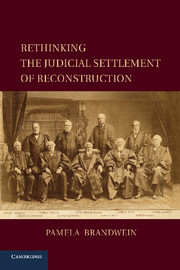Book contents
- Frontmatter
- Contents
- Acknowledgments
- 1 Abandoned Blacks?
- 2 The Emergence of the Concept of State Neglect, 1867–1873
- 3 The Civil/Social Distinction
- 4 The Birth of State Action Doctrine, 1874–1876
- 5 A Surviving Sectional Context, 1876–1891
- 6 The Civil Rights Cases and the Language of State Neglect
- 7 Definitive Judicial Abandonment, 1896–1906
- 8 Twentieth-Century Receptions
- 9 Conclusion
- Bibliography
- Index
3 - The Civil/Social Distinction
An Intramural Republican Dispute
Published online by Cambridge University Press: 03 May 2011
- Frontmatter
- Contents
- Acknowledgments
- 1 Abandoned Blacks?
- 2 The Emergence of the Concept of State Neglect, 1867–1873
- 3 The Civil/Social Distinction
- 4 The Birth of State Action Doctrine, 1874–1876
- 5 A Surviving Sectional Context, 1876–1891
- 6 The Civil Rights Cases and the Language of State Neglect
- 7 Definitive Judicial Abandonment, 1896–1906
- 8 Twentieth-Century Receptions
- 9 Conclusion
- Bibliography
- Index
Summary
In the Civil Rights Cases, Justice Bradley cautioned against treating blacks as “the special favorite of the laws.” The comment appears in the majority opinion's invalidation of the public accommodation provisions and is regularly excerpted in textbooks to demonstrate Bradley's “ceremoniously washing his hands of the freedmen's problems.” From a contemporary perspective, in which equal access to public accommodations is taken to be an essential component of freedom and in which racist scorn for public accommodation rights entails a rejection of an efficacious Fourteenth Amendment, Bradley's derision appears to mark a categorical hostility to Reconstruction.
Meet Judge Emmons. Circuit Judge Halmer H. Emmons was a Grant appointee from Tennessee who wrote the first judicial opinion on the Civil Rights Act of 1875. In a case involving the denial of access to a theater, Judge Emmons advised the jury that the public accommodation provisions were unconstitutional. He expressed disdain for these provisions, calling them “a grotesque exercise of national authority.” Declaring that no “civil right” was at issue in this case, Judge Emmons left little doubt about his sentiments. “I have,” he stated, “but small sympathy with the right of the negro to see the immodest and vulgar display in the ballet dance.”
- Type
- Chapter
- Information
- Rethinking the Judicial Settlement of Reconstruction , pp. 60 - 86Publisher: Cambridge University PressPrint publication year: 2011

